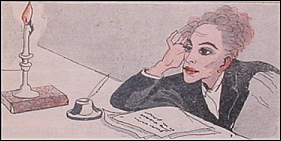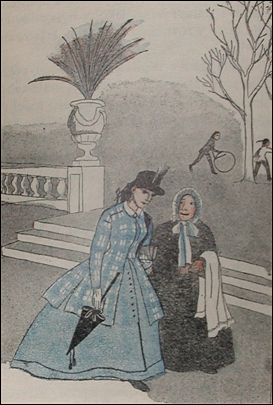
Samuel Cramer, who formerly, under the signature of Manuela de Monteverde, was responsible for a few romantic follies—in the hey-day of romanticism—is the contradictory product of a pallid German and dark Chilean mother. Add to this double origin a French upbringing and a literary civilization, and the queer complications of his character will be less surprising to you—if they do not satisfy or edify you. Samuel has a pure and noble brow, eyes as brilliant as drops of coffee, a teasing and mocking nose, impudent and sensual lips, a square despotic chin and pretentiously republican hair. He is at once very lazy, mournfully ambitious, and illustriously unfortunate; for all his life he has scarcely ever had any complete ideas. The sun of his idleness which shines with constant splendour within him, vaporizes and consumes that moiety of genius with which Heaven has endowed him. Among all those demi-great men whom I have known in this terrible Parisian life, Samuel was, more than any other, the man of beautiful abortive works: a sickly fantastic creature, whose poetry shines much more in his person than in his works, and who towards one o’clock in the morning, between the blaze of a coal fire and the tic-toc of a clock, always appeared to me like the God of Impotence—a modern hermaphroditic god—Impotence so colossal and so enormous that it becomes epic.
How can I explain, how can I let you clearly see the depths of that tenebrous nature, striped with vivid lightning flashes, lazy and at the same time enterprising, fertile in difficult schemes and in ridiculous abortions; a mind in which paradox often assumed the proportions of naiveté, yet whose imagination was as vast as absolute solitude and laziness? One of Samuel’s most natural foibles was to consider himself the equal of those whom he had contrived to admire. After passionately reading a fine book his involuntary conclusion was: ‘Here ’s something fine enough to be my own!’ and from that to thinking, ‘Therefore it is my own’, is merely a matter of omitting the inverted commas.
In the world of to-day a character of this type is more common than one thinks; the streets, the public walks, the estaminets, and all the refuges of idlers swarm with creatures of this sort. They identify themselves so completely with the latest model, as to believe almost that they have invented it. To-day you find them painfully deciphering the mystic pages of Plotinus or Porphyry; to-morrow they will admire how well Crébillon the younger has expressed the French and flighty side of their nature. Yesterday they were conversing familiarly with Jerome Cardan; now they are playing with Sterne or wallowing with Rabelais in all the gluttony of hyperbole. Besides, they are so happy in each of their metamorphoses that they are not in the slightest annoyed with all those fine geniuses for having anticipated them in the esteem of posterity. What naive and respectable impudence! Such was poor Samuel.
By birth a very gentlemanly fellow, and a bit of a rogue for diversion—an actor by temperament—he played, for his private benefit and in camera, incomparable tragedies, or rather tragicomedies. If the wing of gaiety brushed and tickled him, he had, of course, to impress the fact upon himself, so our man used to practise bursting into fits of laughter. Did a tear but well up in the corner of his eye at some memory, he went to the mirror to watch himself cry. If some trollop in a fit of brutal and childish jealousy scratched him with a penknife or a needle, Samuel glorified it into a dagger thrust, and when he owed a few wretched twenty thousand francs he used to shout joyously:
‘What a sad and lamentable fate to be a genius harassed by a million of debts!’

By the way, please don’t believe that he was incapable of knowing true sentiments, or that passion merely brushed his epidermis. He would have sold his shirt for an almost complete stranger whose hands and countenance he had examined and yesterday made his bosom friend. To the things of the mind and soul he brought the idle contemplativeness of Germanic natures; to matters of passion, the rapid and fickle ardour of his mother; and to the practice of life all the foibles of French vanity. He would have fought a duel for an author or an artist two centuries dead. Just as he had been furiously devout, he was passionately atheistic. He was at once all the artists he had studied and all the books he had read, and yet, despite this protean faculty, he remained profoundly original. He was always the gentle, the fantastic, the lazy, the terrible, the erudite, the ignorant, the Bohemian, the dandy Samuel Cramer, the romantic Manuela de Monteverde. He raved over a friend as over a woman, loved a woman as a comrade. He possessed the logic of all the good sentiments, and the science of all sorts of knavishness, and nevertheless he never succeeded in anything because he believed too much in the impossible. Why should it be astonishing? He was always conceiving the impossible.
Samuel, one evening, hit on the idea of going out; it was beautiful, scented weather. He had, in accordance with his natural taste for the excessive, equally violent and prolonged habits of seclusion and dissipation, and for a long time he had remained faithful to his house. The maternal laziness, the Creole love of doing nothing which flowed in his veins prevented him from finding anything intolerable in the disorder of his room, his linen, and his greasy, excessively tangled hair. He combed it, washed himself, managed in a few moments to recover the dress and aplomb of people for whom elegance is an everyday affair; then he opened the window. The warm golden light rushed into the dusty study. Samuel was astonished to see how quickly and noiselessly spring had come. A mild air, impregnated with sweet odours, made his nostrils twitch. One part of it mounting to his brain filled him with dreaminess and desires, the other naughtily stirred his heart, his stomach and his liver. Resolutely, he blew out his two candles, one of which was still palpitating on a volume of Swedenborg, and the other flickered out on one of those shameful books the reading of which is profitable only to minds possessed of an immoderate taste for truth.
From the height of his solitude, cluttered with documents, paved with old books and peopled with his dreams, Samuel often observed whilst walking in an allée of the Luxembourg, a face and form which he had loved in the provinces, at an age when one really loves. Her features, though matured and blunted by some years of use, had the profound and decent grace of the respectable woman; in the depths of her eyes there still shone occasionally a humid, virginal dreaminess. She used to come and go, always escorted by quite a smart maid, whose face and demeanour revealed the confidante and companion rather than the servant. She seemed to seek out the deserted spots, and used to sit down sadly in widow-like attitudes, absently holding in her hand a book which she did not read.
Samuel had known her in the neighbourhood of Lyons, when she was young, alert, sprightly and thinner. By dint of watching her, and so to speak recognizing her, he had revived one by one all the tiny memories which attracted him to her in his imagination: he had recounted to himself, detail by detail, the whole of this youthful romance, which since that time had lost itself in the preoccupations of his life and in the labyrinth of his passions.
On that particular evening he raised his hat to her with more care and ceremony. Passing in front of her he heard behind him this snatch of dialogue.
‘What do you think of that young man, Mariette?’
But this was said in such an absent-minded tone that the most malicious observer could have found no fault with the lady.
‘Oh, I think he is very nice, madame. Madame knows that it is M. Samuel Cramer?’
And more severely:
‘Now how do you happen to know that, Mariette?’

